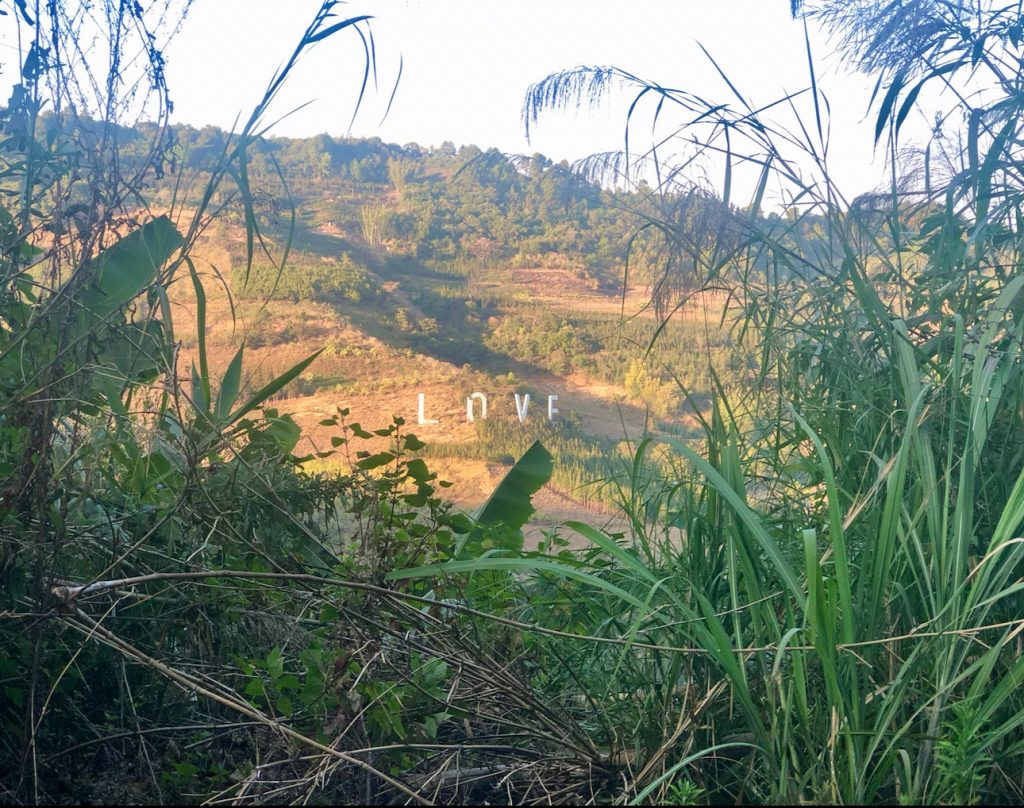
This blog post cites the content presented in article by an organisation called WildChina on Green Initiatives in China’s cities. WildChina is a travel company that offers exclusive and socially responsible travel experiences customized to meet the preferences of our leisure, education, and corporate clients. They go beyond the conventional travel experiences by creating immersive adventures that challenge preconceptions and inspire new stories.
Monday April 22nd is international Earth Day, an opportunity to reflect again on the climate emergency we are currently entering and to remind ourselves that this is a planetary crisis, truly without borders, and where mutual understanding and co-operation between the UK and China has the potential to make significant contributions to more sustainable futures.
I think in the UK we should appreciate that sustainability is a major issue for the Chinese people. They are aware that the achievements of the successful industrial and agricultural advances of the 1980’s and 1990’s came at some cost to the environment and are now determined to swing the pendulum back towards nature. Everywhere you will hear talk of ‘harmony’ as being the principle that the whole society should be working towards.
There was a very famous example of ‘harmony’ in 2021. In the southern province of Yunnan there are herds of wild elephants. The elephants have a national park area where they are protected. However the elephants, probably looking for new natural resources, wandered out of the park and started to make their way towards Kunming, the provincial capital. The event caused a lot of concern, because of the damage that the herd might cause. Yunnan is predominantly an agricultural province where many people still depend on growing and selling crops for their livelihoods.
Naturally the elephants would forage whatever was in their path. There was talk of all sorts of violent measures to force the elephants back onto their reserve. And then the most wonderful narrative developed, which can only be described as a love of nature and harmony. They simply decided to let nature take its course. For 110 days the elephants roamed through the villages, towns and fields of Yunnan heading north before learning that the colder northern parts of the province did not make good habitat and turning south again.
150,000 residents were temporarily re-located to prevent incidents, of which there were none. The elephants had their own dedicated police force of 25,000 officers to protect and gently guide them. 180 tonnes of food were provided to the migrating animals. As you can imagine members of the herd became media celebrities with daily news reports tracking their exploits and progress. The event became a national affirmation of the support of the Chinese people for the mission of China to become a ‘shēngtài wénmíng’ , an ‘ecological civilisation’.
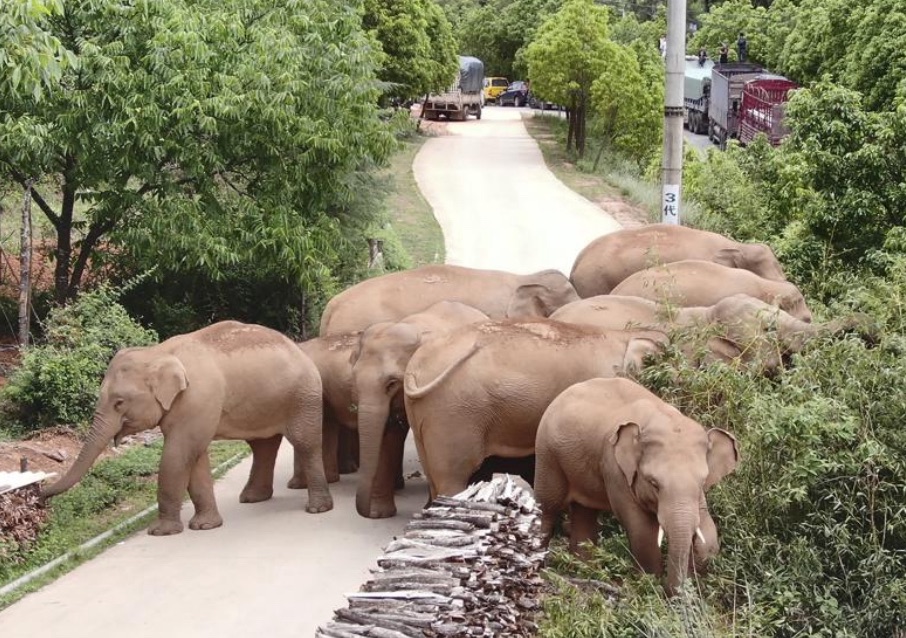
The origins of this national ambition perhaps lie in the foundations of Chinese culture around the philosophies of Buddhism and the dào. Buddhism includes the teaching of compassion between all living creatures. Many buddhists follow the precept that society fundamentally means humans and all living things, not just humans. This can be put alongside the christian view that all living things should be respected, because they were god’s creations.
This buddhist view of living in harmony with nature perfectly complements the teachings of the dào. Dào simply means ‘the path’ and the wisdom of this philosophy proposes that human happiness consists in following the most natural and organic path possible through life, and avoiding all temptations to interfere with or control the natural order of things. At the heart of the dào philosophy is this idea, 无为 wúwéi, which is hard to translate because I can’t think of an obvious English equivalent, but it’s meaning is we should not interfere with or try to control, the natural flow of things.
I think we can agree that if the world followed this way of thinking we probably wouldn’t need an Earth Day, because in the past we would have found ways to manage the development of society without environmental destruction.
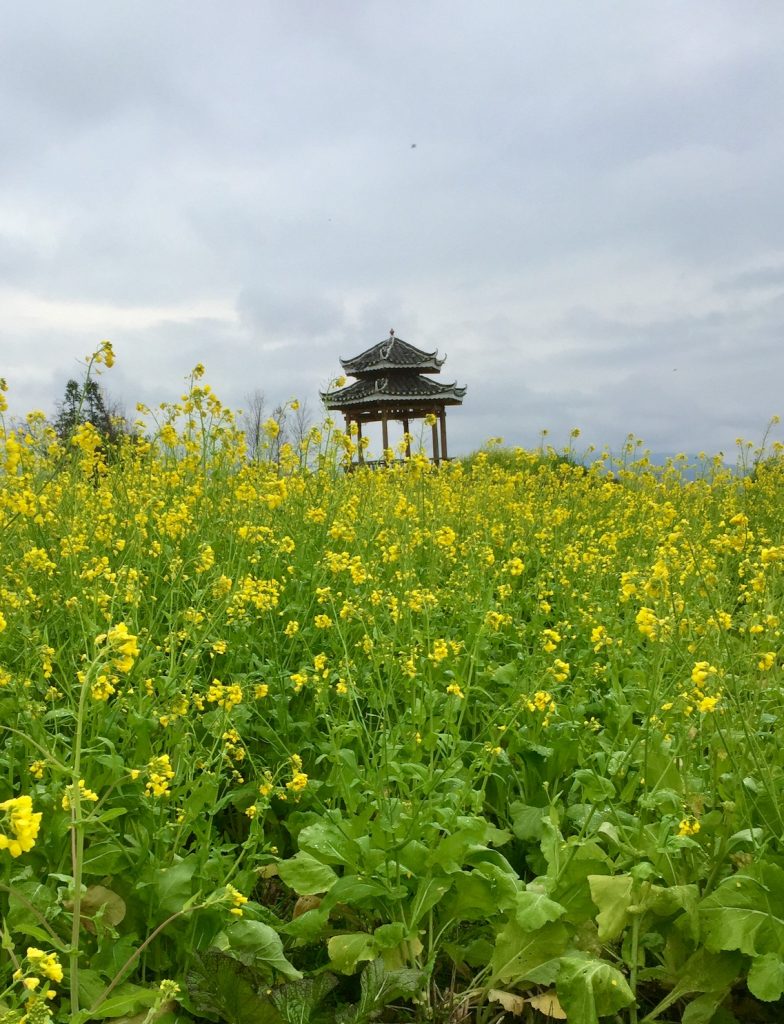
China, Britain and the rest of the world are now in this situation where a transition is needed, a re-imagining of the balance between humans and the natural world. It is undeniable that the modern sciences of technology, medicine, urban development and economics have made life more comfortable than in previous centuries. However in the process, over the last 50 years, I think we have to conclude that the very growth that has improved the lives of millions has taken the planet to a perilous place.
There is international consensus on the nature and scale of the problems. The Intergovernmental Panel on Climate Change (IPCC), has identified scientifically a set of seven global ‘tipping points’ where there is an imminent danger that continued growth in CO 2 emissions with consequent increases in global temperatures and continued damage to natural eco-systems through unregulated farming or fishing, will cause irreparable damage.
A case in hand is the Greenland Ice sheet. The Arctic ice sheet is warming 3 to 4 times faster than the rest of the world, adding almost 1mm to global sea levels every year. As the world’s second-largest ice sheet, the Arctic holds enough water that, if melted completely, could raise sea levels by 7.2 metres (22 feet). A 1.5C increase in average temperatures could be the threshold at which the region’s ice sheet melting would become irreversible. China, Britain and America are amongst the countries of the world directly threatened by rising sea levels. Mega-cities on every continent will face serious impacts, including Lagos, Bangkok, Mumbai, Shanghai, London, Buenos Aires and New York. The danger is especially acute for some 900 million people living in coastal zones at low elevations –one out of every ten people on earth.
The importance of Earth Day has increased every year since it started in 1970. Facts like those outlined above for just one of the seven tipping points make it abundantly clear that international co-operation rather than nationalistic isolationism is now called for. The metaphor of ‘fiddling while the world burns’ could not be more appropriate. The encouraging news is there have been recent examples of government level co-operation between China and the UK to agree common strategies. In 2015 a ‘Clean Energy Partnership’ was established was expected to encourage more investment in clean technologies, which in turn could help to reduce their costs in both countries. At the same time, the China National Expert Committee on Climate Change and the UK’s Committee on Climate Change have agreed to establish a new process of joint work on climate change risk assessment, recognising the importance of risk assessment for informing climate change policy. In 2021 there was a round of high level dialogue between China and the UK around that year’s COP 26 conference. China and the United Kingdom reaffirmed their commitment to the principle of common but differentiated responsibilities to complete negotiations over rules for the landmark 2015 Paris Agreement.
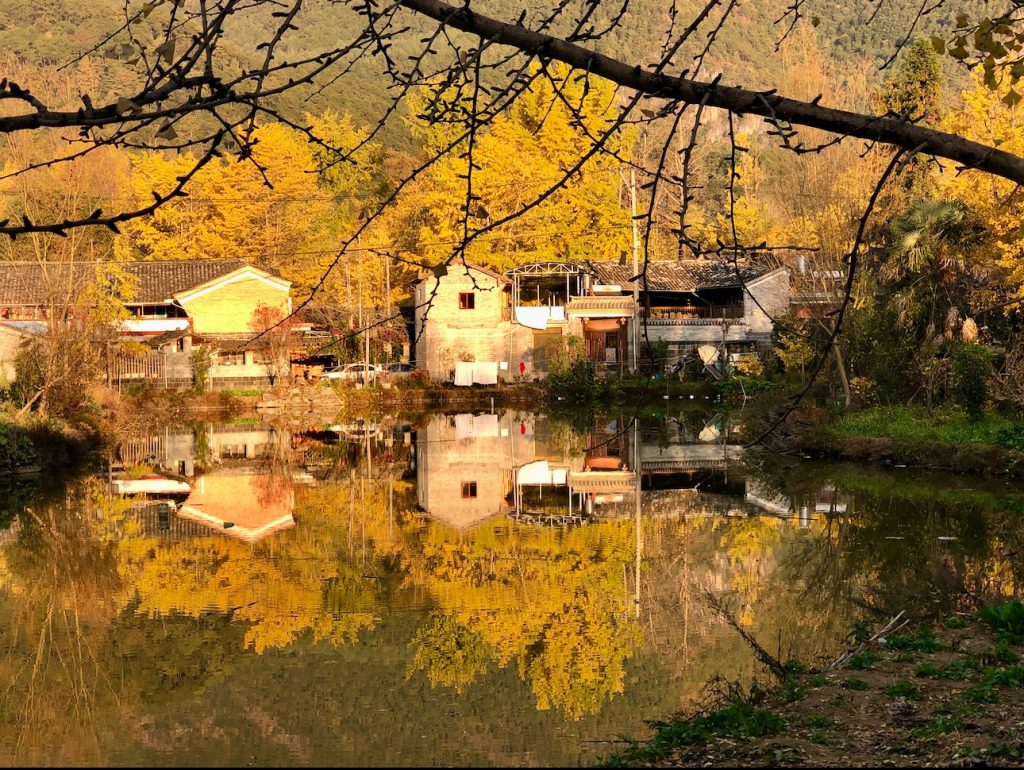
However since then it seems the focus of climate change related partnerships has swung away from the UK. In November 2023 China and the United States signed the the ‘Sunnylands Statement on Enhancing Cooperation to Address the Climate Crisis’. This agreement included a commitment to ongoing co-operation between the two countries on climate change. China and the United States decided to set up a Working Group on Enhancing Climate Action in the 2020s, to engage in dialogue and cooperation to accelerate concrete climate actions in the 2020s.
Dialogue between China and the European Union around climate change initiatives is also assuming greater importance. In 2022, the third High-level Environment and Climate Dialogue between China and the European Union was held where both sides agreeing to deepen cooperation on environment, climate, and energy. In December 2023 the 24th China-EU Summit took place which amongst other agreements deepened partnerships around global challenges such as food security, climate change and public health, and working for positive outcomes from COP28.
Just this year German Chancellor Olaf Scholz was in China to stabilise and deepen ties of co-operation with China, including partnerships in green development, communication and coordination on green and environmental protection issues, promoting the research and development of green energy technology and industrial technology upgrading, and deepening cooperation in such fields as new energy vehicles, green finance, and third-party markets. I’m sure part of our Earth Day hopes are for initiatives such as these to bear fruit.

But let’s come back to Earth and finish by reminding ourselves what Earth Day means for humans and our fellow species. Let me showcase a few initiatives here in China. It would be wonderful to find equivalent projects in the UK and to build links if possible. First of all I’d like to re-introduce you to my friend, Wu Hongping. He’s a farmer, poet and philosopher I met while on Spring Festival travels in the southern city of Dali. He has built a community called ‘Veggie Ark, Future Spaces’, which offers people who stay there, long-term or short-term, the opportunity to experience an ‘earth friendly’ life-style. For example he creates ‘raw food’ lunches, where every item on the table is more or less brought directly from the field to your plate.

Now in Sichuan province we can call in on the Daoming Bamboo Craft Village. This is a remarkable example of what human creativity can achieve when it works in harmony with nature and tradition. The village is a single organic structure which has been constructed in the shape of a figure 8, or infinity symbol. Much of the building is built from locally sourced bamboo wood so that the building itself keeps alive bamboo crafts which are in danger of disappearing in the local community. The building features an incredible ‘floating roof’ that forms a continuous organic ‘shell’ over the structure, making it an embodiment of harmony. But it’s not only in rural areas that China is trying to turn sustainability thinking into day to day experiences.

Finally let’s pop over to Shanghai, a sprawling mega-polis of 24.87 million people. The city government is committed to making the city more sustainable. For example it is introducing a very smart new waste management system. In order to dispose of waste, citizens have to log into a centralised system which then generates a ‘waste tax’ according to how much you want to dispose of. The city is constantly adding green spaces to increase the lungs of the city and improve air quality for all, humans, animals, plants.
There are incentives for the construction of innovative sustainable building projects. One such is the Shanghai Tower. The tower is immediately recognisable by its unique, organic twisting design, that makes it more efficient. The tower incorporates 47 different sustainability technologies which slightly increased the overall cost (by 5%) but reduced energy consumption by up to 54%. Over 25,000 panels measuring 2.14 meters in length that form a curtain wall have double-glass windows, reducing the carbon footprint by 34,000 tons per year. The Shanghai Tower also incorporates smart control systems that monitor electric consumption and generate savings of 556,000 dollars each year in energy costs. Near the top of the building, 270 wind turbines have been installed, providing the energy required to illuminate the exterior of the building. The skyscraper also has 21 gardens distributed on each of the nine zones that help to regenerate the air thanks to their plants and trees.
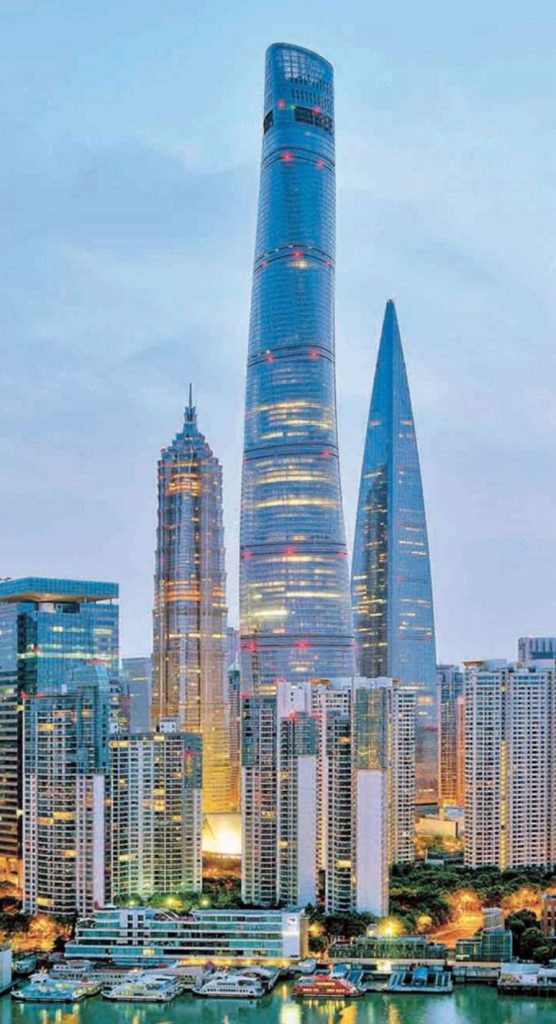
Signs of hope for Earth Day. In China, both at government level and at the grassroots, the earth-saving agenda of a transition to zero carbon, sustainable lives for humans and our brother and sister species is taking root. What equivalent projects are happening at ground level in the UK? What can SACU do to make connections between the ideas and experiences of leaders for sustainability in our two countries? What can SACU do to keep asking the right ecological questions to maintain the momentum towards greener futures for all?
This Earth Day, let’s become active ‘friends of the earth’ again.
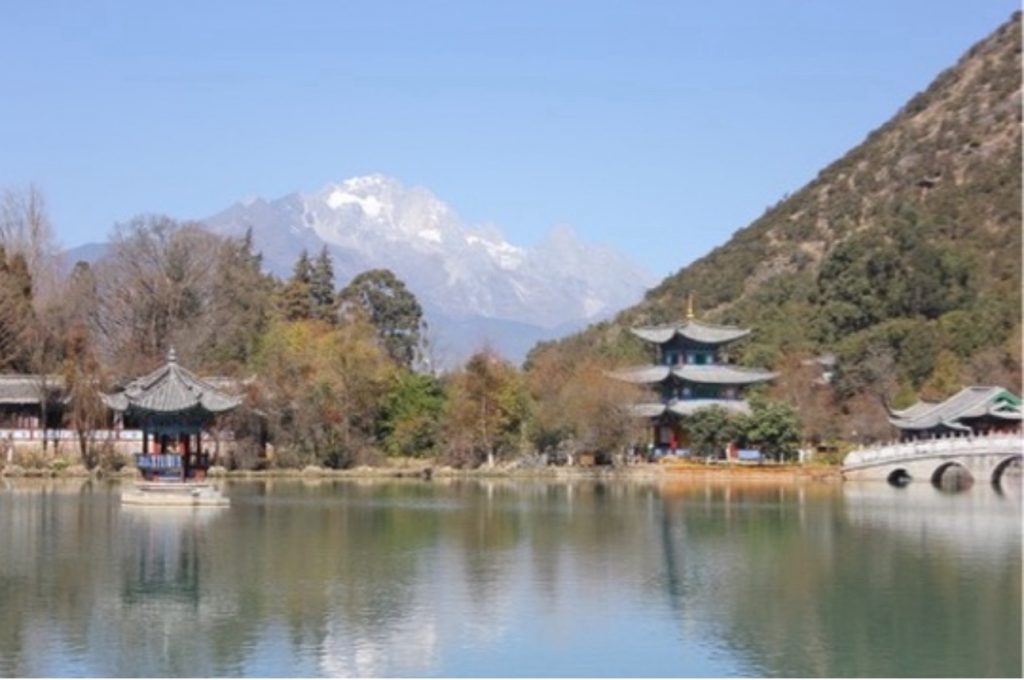
Please see the WildChina article here :
(The photographs except where credited are originals by the author chosen to represent the Earth Day theme of harmony.)